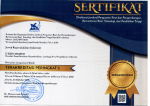MENILIK ULANG ARTI KELUARGA PADA MASYARAKAT INDONESIA
Abstract
Currently, social dynamic is growing fastly. A similar situation can also be seen in Indonesian societies, including in the smallest scale, which is family. This study aims to answer whether the definition of family that is used by the Indonesian government is still relevant to portrait the condition of societies in this country nowadays. This study used literature review as the primary data source and anthropological approach as an analysis tool. This article presents discussions on family dynamics in Indonesia, family and marriage, long distance family, as well as family and Indonesian culture. In conclusion, the family concept in Indonesia should not be constrained by structure, location and gender division. Therefore, Indonesia as a state should construct a more flexible definition of family to adjust community diversity and to shed lights on various family contexts and individual experiences.
Keywords
Full Text:
PDFReferences
“Analisis proses bisnis PT. Wingsâ€. (2013). Catatan Digital. Retrieved from: http://jefryrifkiefahrezy.blogspot.co.id/ 2013/11/analisis-proses-bisnis-ptwings.html
Anderson, B. (1991). Imagined communities: Reflections on the origin and spread of nationalism (Revised Edition). London and New York: Verso.
Angelina, M. (2014). Gambaran komitmen pasangan samen leven (kumpul kebo) (Skripsi). Universitas Indonesia Esa Unggul, Jakarta. Retreived from: http://digilib.esaunggul.ac.id/UEU-Undergraduate-2007-71-091/1668
Beasley, C. (1994). Sexual economyths: Conceiving a feminist economics. New South Wales, Australia: Allen and Unwin.
Belandina, L. (2015). Peranan keluarga dalam budaya Indonesia. Retrieved from: www.fokal.info/fokal/2015/10/peranan-keluarga-dalam-budaya-indonesia/ crossref
Blackburn, S. & Bessel, S. (1997). Marriageable age: Political debates on early marriage in twentieth-century Indonesia. Indonesia, 63, 107-141. crossref
Brah, A & Phoenix, A. (2004). Ain’t I a woman: Revisiting intersectionality. Journal of International Women’s Studies, 5(3), 75-86.
Buttenheim, A.M. & Nobles, J. (2009). Ethnic diversity, traditional norms, and marriage behaviour in Indonesia. Population Studies: A Journal of Demography, 63(3), 277-294.. crossref
Friedman, M & Schultermandl, S (Ed). (2011). Growing up transnational: Identity and kinship in a global era. Toronto: University of Toronto Press
Goode, W. (1963). World revolution and family patterns, New York: Free Press.
Hamdi, I. (2017, 17 Februari). Hasil survei, orang Indonesia paling intoleran dengan LGBT. Tempo Online. Diakses dari https://nasional.tempo.co/read/news/2017/02/17/173847431/hasil-survei-orang-indonesia-paling-intoleran-dengan-lgbt
Hatmadji, S.H & Utomo, I D (Ed). (2004). Empowerment of Indonesian women: Family, reproductive health, employment and migration. Jakarta: Demographic Institute, Faculty of Economics University of Indonesia.
Hays, J. (2008). Marriage, polygami and divorce in Indonesia. Retreived from: http://factsanddetails.com/indonesia/People_and_Life/sub6_2d/entry-3989.html.
“Iklan layanan masyarakatâ€. (2010, 13 Januari). Jual Iklan Jadul. Diakses dari http://iklan-jadul.blogspot.com/ 2010/01/iklan-layanan-masyarakat.html
Kementerian Kesehatan Republik Indonesia. (2016). Pedoman umum program Indonesia Sehat dengan pendekatan keluarga. Jakarta: Kementerian Kesehatan RI
Laksmiwati, I.A.A. (2003). Transformasi sosial dan perilaku reproduksi remaja. Jurnal Studi Jender SRIKANDI, 3(1), 1-11. Retreived from: http://docplayer.info/30868510-Transformasi-sosial-dan-perilaku-reproduksi-remaja-ida-ayu-alit-laksmiwati.html
Maizufri, Ratna, I.N.K.R, Cika, I.K., & Kusuma, I.N.W. (2014). Cultural diversity in three Motingo Busye’s romance ‘popular’ novel, e-Journal of Linguistics. Retreived from: http://ojs.unud.ac.id/index.php/eol/article/viewFile/4531/3446
Nilan, P. (2008). Youth transitions to urban, middle-class marriage in Indonesia: Faith, family and finances. Journal of Youth Studies 11(1), 65-82. crossref
Nurmila, N. (2007). Negotiating polygamy in Indonesia: Between Muslim discourse and women’s lived experiences (Unpublished Ph.D. Thesis). University of Melbourne, Melbourne.
Oktriyanto, Puspitawati, H., & Muflikhati, I. (2015). Nilai anak dan jumlah anak yang diinginkan pasangan usia subur di wilayah perdesaan dan perkotaan, Jurnal Ilmu Keluarga dan Konsumen, 8(1): 1-9. crossref
Parrenas, R. S. (2005). Children of global migration: Transnational families and gendered woes. Stanford, California: Stanford University Press.
Puspitawati, H. (2012). Gender dan keluarga: Konsep dan realita di Indonesia. Bogor: PT IPB Press.
Rohman, A. (2013). Reinterpret polygamy in Islam: A case study in Indonesia, International Journal of Humanities and Social Science Invention, 2(10): 68-74. crossref
Rubis, A. (2011). The long-distance family: New, and made in America. Huffington Post. Retreived from: http://www.huffingtonpost.com/anastasia-rubis/long-distance-families_b_1136438.html
“Rumah masa depanâ€. (2006, 13 Oktober). 80-an. Diakses dari http://lapanpuluhan.blogspot.co.id/2006/10/ rumah-masa-depan.html
Santoso, D. (2003, 1 Desember). Getting around the inter-religious marriage law. The Jakarta Post. Retreived from: http://www.thejakartapost.com/news/2003/12/01/getting-around-interreligious-marriage- law.html
Soemanto, R.B. (2002). Pengertian dan ruang lingkup sosiologi keluarga. Retreived from: repository.ut.ac.id/4652/1/SOSI4413-M1.pdf.
Sunaryo, A. (2010). Poligami di Indonesia (Sebuah analisis normatif-sosiologis). Yin Yang: Jurnal Studi Gender dan Anak, 5(1), 143-167. Retreived from: http://ejournal.iainpurwokerto.ac.id/index.php/yinyang/article/view/265
Supriyantini, S. (2002). Hubungan antara pandangan peran gender dengan keterlibatan suami dalam kegiatan rumah tangga (Tesis). Universitas Sumatera Utara, Medan. Retreived from: library.usu.ac.id/download/fk/psiko-sri.pdf
Von Der Borch, R. (2008). Straddling worlds: Indonesian migrant domestic workers, dalam M. Ford & L. Parker, Women and work in Indonesia. Oxon, UK: Routledge
DOI: https://doi.org/10.14203/jki.v13i1.305
Copyright (c) 2018 Jurnal Kependudukan Indonesia

This work is licensed under a Creative Commons Attribution-NonCommercial-ShareAlike 4.0 International License.
-----------------------------------------------------------------------------------------------------------------------------
Research Center for Population, Indonesian Institute of Sciences
Widya Graha Building, 7th and 10th floors
Jl. Jenderal Gatot Subroto 10 Jakarta Selatan, Telp (021) 5221687
Website: http:/kependudukan.lipi.go.id;
E-Journal: http://ejurnal.kependudukan.lipi.go.id
Pustaka: http://pustaka.kependudukan.lipi.go.id
-----------------------------------------------------------------------------------------------------------------------------








